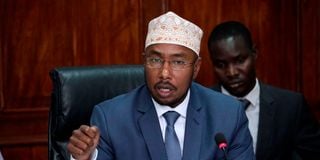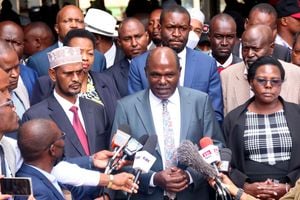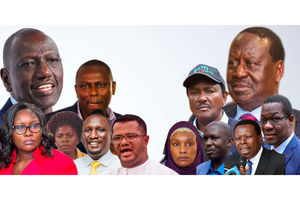
IEBC chief executive Marjan Hussein Marjan.
The time for a review of electoral boundaries has come, but politicians and legal experts are divided over the implications of the breach of constitutional deadlines caused by a dysfunctional electoral commission.
The Constitution’s 12-year deadline for reviewing boundaries —and possibly changing the number of electoral units, currently set at 290 — expires next month.
The last review took place on March 7, 2012, leaving only one month before the deadline.
Given that the electoral body charged with overseeing the exercise is not properly constituted, it is a tall order to meet the deadline.
Article 89 (2) of the Constitution gives the Independent Electoral and Boundaries Commission (IEBC) a maximum of 12 years after the promulgation of the supreme law of the land to review the boundaries.
“The IEBC shall review the names and boundaries of constituencies at intervals of not less than eight years and not more than twelve years, but any review shall be completed at least twelve months before a general election of Members of Parliament,” it stipulates.
The IEBC is currently being run by the secretariat after the term of the commissioners led by chairman Wafula Chebukati, Boya Molu and Abdi Guliye expired on January 17, 2023.
The other commissioners, commonly referred to as Cherera 4, led by vice-chairperson Juliana Cherera, commissioners Irene Masit, Justus Nyang’aya and Francis Wanderi resigned or were forced out immediately after the 2022 presidential election. They disagreed with the results announced by Mr Chebukati, which saw Dr William Ruto become President.

The then chairman of the Independent Electoral and Boundaries Commission, Wafula Chebukati (centre), addresses journalists at Anniversary Towers in Nairobi on April 26, 2022. The commission is supposed to conduct a boundary review before March 2024.
The Constitution adds that each review shall be completed at least 12 months before a General Election of Members of Parliament.
Opinion is divided over whether the country will be plunged into a constitutional crisis next month, particularly over the legitimacy of at least 27 constituencies, that have climbed to 67.
The number of constituencies has reportedly risen to 67, according to IEBC data — yet they are below the constitutional average population quota required for their continued legal recognition.
The doubts about the legality of these constituencies are profound, given the implications for the tenure of their representatives in Parliament and the legality of the allocation of national resources, including the CDF.
However, it is undisputed that a constitutional amendment is inevitable to address the legal vacuum created by the breach of the deadlines for the boundary review.
Experts argue that a negotiated political document before Parliament holds the key to resolving the impasse and as such its passage is a matter of urgency for the House when it reconvenes next week.
This means that to comply with the Constitution, the IEBC ought to have completed the exercise either by July 2021 —12 months before the August 9, 2022 General Election.
The last review of the then 210 constituencies was done in 2012, resulting in the creation of 290 constituencies, which were gazetted on March 7, 2012.
Last week, High Court Judge Mugure Thande ordered the immediate reconstitution of the IEBC to conduct by-elections in the Banissa Constituency, which some fear will have a negative impact on the National Dialogue Committee (Nadco) report before Parliament.

IEBC Selection Panel members (from left) Novince Euralia Atieno, Evans Misati James, Charity Kisotu, Nelson Makanda, Bethuel Sugut, Fatuma Saman and Benson Ngugi Njeri at KICC, Nairobi, on March 6, 2023.
The report was prepared by representatives of President William Ruto and opposition leader Raila Odinga following mediation talks to end anti-government demonstrations.
Among its recommendations are a negotiated reconstitution of the IEBC and a proposed constitutional amendment to extend the intervals at which constituency boundaries are to be reviewed.
“The committee recommends that the Constitution be amended to provide that Parliament may, by a resolution passed by at least two-thirds of its members, extend the intervals within which boundary reviews may be conducted,” the Nadco report said. The report further recommended that the boundary delimitation process be provided for by way of an amendment to the IEBC Act, 2011.
Nadco was co-chaired by former Vice-President and Wiper leader Kalonzo Musyoka and Kikuyu MP Kimani Ichung’wah, the National Assembly Leader of Majority.
If the extension of the boundary delimitation period goes through, it will be the first amendment to the Constitution, which was promulgated on August 27, 2010.

National Dialogue Committee co-chairpersons Kalonzo Musyoka and Kimani Ichung'wah flanked by committee members present their final report at the Hilton Garden Inn on November 25, 2023.
Rarieda MP Otiende Amollo, nominated MP John Mbadi and Jubilee Secretary-General Jeremiah Kioni warned of a looming constitutional crisis.
But constitutional lawyer Bob Mkangi and Homa Bay Town MP Peter Kaluma, a city lawyer, downplayed the issue, saying there was no cause for alarm.
Dr Amollo, a Senior Counsel, and Mr Mkangi are former members of the defunct Committee of Experts (CoE) that drafted the current Constitution, while Mr. Kioni is the immediate former MP for Ndaragua.
Dr Amollo and Mr Kaluma are members of the Justice and Legal Affairs Committee (JLAC) of the National Assembly.
The vacancies at the IEBC arose after the terms of the chairman Mr Chebukati and members Mr Guliye and Mr Molu expired in January 2023.
Three other commissioners —Ms Cherera and members Mr Nyangaya and Mr Wanderi — were forced out of office by political pressure immediately after the 2022 presidential election, while Ms Irene Masit was sacked by a tribunal formed by the President.
This means that the commission cannot function and therefore the March 7 deadline cannot be met.
“We are facing a constitutional crisis because the IEBC commissioners are not up to the task,” said Dr Amollo.
Mr Kioni said amending the Constitution to extend the delimitation timelines is the way out, noting that the Jubilee Party leadership wanted to save the country from the current situation by pushing for the Building Bridges Initiative (BBI).
“BBI was meant to address the current situation where timelines have expired, IEBC is not in place and very divisive campaigns are going on. The passage of the BBI would have meant that the IEBC would have embarked on a review of the constituency boundaries,” said Mr Kioni as he accused the Kenya Kwanza administration of being responsible for the current mess.
Mr Mbadi noted that a constitutional amendment should be the way out of the looming crisis that risks delegitimising the existing constituencies.
“It is a big challenge we face as a country because we do not have a functioning IEBC. The delimitation of boundaries is not a joke, it is very emotive,” Mr Mbadi said, adding: “One wonders if we need the provision in the Constitution to review the boundaries.”
“There is a total lack of responsibility on the part of the current government, which is busy campaigning at the moment. Right now we are talking about 67 constituencies that do not meet the constitutional threshold to exist,” Mr Kioni said. “The boundaries need to be reviewed before people vote in 2027.”
Dr Amollo, however, added that it is not all doom and gloom as it is possible to extend the time for delimitation by amending the Constitution with the support of at least two-thirds of the 349 members of the National Assembly.
“All that is required is the political goodwill of the Kenya Kwanza administration to convene Parliament for a special sitting to deliberate on the matter of extending the time for delimitation through an amendment to Article 255 of the Constitution,” said Dr Amollo.

Parliament in session on November 9, 2023. Experts argue that a negotiated political document before Parliament holds the key to resolving the impasse.
Mr Mkangi argued that the country has no choice but to use the existing boundaries in the hope that the exercise will be completed in time for the 2027 General Election, even as he blamed the delayed delimitation on lack of political goodwill.
“The thing is that IEBC had started the process but for the current challenges facing the institution. We need to ask ourselves some hard questions including whether we are a banana republic, a failing or a failed state because we read or hear such stories,” Mr Mkangi said.
Mr Kaluma argued that a boundary review doesn’t mean that the boundaries must change at the end of the process.
“The boundaries for the constituencies will remain as they are until the next time the nation goes through this process. There’s no cause for alarm. The Constitution of Kenya was made by the people of Kenya,” said the Homa Bay Town MP.
Mr Mkangi advised that to resolve the matter: “We may however need the courts to bridge the gap and give us guidance on how to proceed in a constitutionally sound manner so as to avoid challenges based on the procedural and technical minefields we find ourselves in.”
Importantly, Mr Mkangi noted:”First things first — let us get the IEBC structurally and functionally sound, like yesterday!”
Mr Kioni noted that it is not tenable to abolish any constituency and to avoid this, it is necessary to increase the number of constituencies to protect the protected ones and find a mechanism to harmonise the large constituencies.
He said that under the BBI process, the campaign for the delimitation of boundaries and the 2022 general election should be done under the same period to save the country funds.
“We are in a situation where the current economic situation has made the people reject anything that is being pushed by the Kenya Kwanza government,” said Mr Kioni.
At the time of the establishment of Nadco, the IEBC had vacant chairperson and member positions.
The vacancies at the IEBC affected the implementation of several of the commission’s activities— by-elections, boundary delimitation and the review of several policy documents.
“The Kenya Kwanza leadership, guided by political goodwill, can use the special session of the National Assembly that we have called for on February 6, 2024 to start the process of amending the Constitution by debating and adopting the report of the bi-partisan talks,” said Dr Amollo.
He also dismissed claims that the High Court ruling had nullified the Nadco report, a product of the bipartisan talks, saying Justice Thande’s ruling on the urgent need to reconstitute the IEBC for the purpose of by-elections in areas that are not represented “is very much in order”.
The Senior Counsel added, however, that the judge’s position on Nadco remains her opinion as “neither Nadco, its leadership and the President and Mr Odinga nor others were represented in the case.”










